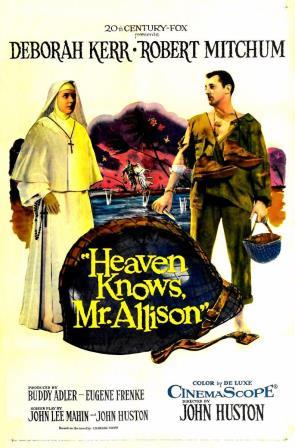 They were alone on this Pacific Island… trapped behind enemy lines… the marine who had been thru Hell and Sister Angela with her supreme faith in God.
They were alone on this Pacific Island… trapped behind enemy lines… the marine who had been thru Hell and Sister Angela with her supreme faith in God.
Director John Huston always had a penchant for alternating deeper, more substantial films against lighter, more fun productions; Beat the Devil and The List of Adrian Messenger are prime examples of the latter category.
Surely 1957’s Heaven Knows, Mr. Allison must fits into the former category, though today the film isn’t usually mentioned as among Huston’s best. Its sister film The African Queen most always is. Though there’s lots to like in both pictures, Heaven Knows, Mr. Allison might be the better picture.
The plots of the two pictures are almost identical, with an island filling in for the Queen and World War Two Japanese filling in for World War One Germans. Again it’s two stars alone and battling against the odds for survival and perhaps, victory over their wartime enemies. Both films feature sharp on location shooting and excellent casts.
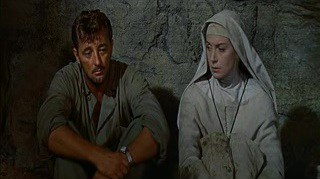 What gives Heaven Knows, Mr. Allison the edge is the casting. with no disrespect to Bogart and Hepburn, but by the time of The African Queen the two stars had become iconic, which sadly detracts from the proceedings. In Allison, we are presented with Robert Mitchum and Deborah Kerr, both of whom are excellent actors in their own right without the extra baggage of super stardom.
What gives Heaven Knows, Mr. Allison the edge is the casting. with no disrespect to Bogart and Hepburn, but by the time of The African Queen the two stars had become iconic, which sadly detracts from the proceedings. In Allison, we are presented with Robert Mitchum and Deborah Kerr, both of whom are excellent actors in their own right without the extra baggage of super stardom.
Mitchum is Corporal Allison, a Marine who washes ashore on an almost deserted Pacific island after a naval battle. After a quick search he discovers that the only inhabitant is Sister Angela (Deborah Kerr). Though a war is waging the focus on the picture is on the two characters as they get to know each other. The Japanese appear briefly (at first), only to abandon and then subsequently reinhabit the island. Finally, as expected, the Americans land after a short barrage and take the island. Pretty simple.
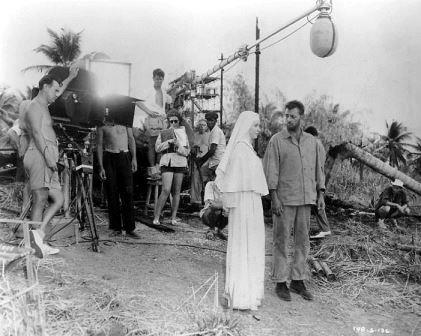 What makes it such an engrossing film to watch is the interplay between Mitchum and Kerr. Mitchum, who was wary of starring against Kerr, whom he perceived as a bit of a ‘fuddy-duddy’ before filming, found a great respect for her after she broke into a curse filled tirade after an aborted scene on set. Ultimately the two (neither of whom ever won an Academy Award for any of their performances) made three additional films and became close friends.
What makes it such an engrossing film to watch is the interplay between Mitchum and Kerr. Mitchum, who was wary of starring against Kerr, whom he perceived as a bit of a ‘fuddy-duddy’ before filming, found a great respect for her after she broke into a curse filled tirade after an aborted scene on set. Ultimately the two (neither of whom ever won an Academy Award for any of their performances) made three additional films and became close friends.
One of the challenges of the film which caused great angst to director John Huston was how to adapt the book’s romantic culmination of the duo’s relationship in a way that would satisfy the strict censors at the time, who were particularly prickly about the depiction of the clergy. At times mentioning Heaven Knows, Mr. Allison both as one of his favorite and most disappointing films, it is clear that director Huston was never completely satisfied with the results.
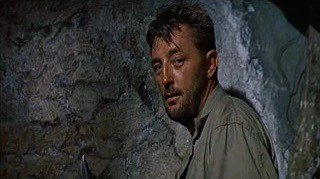 The results, however, speak for themselves. Though the threat of war always looms, there’s little action until the final minutes. The bulk of the picture is the wondours interplay between Mitchum and Kerr, all absent of the gratuitous nudity, language and sex which would be paramount in such a production today.
The results, however, speak for themselves. Though the threat of war always looms, there’s little action until the final minutes. The bulk of the picture is the wondours interplay between Mitchum and Kerr, all absent of the gratuitous nudity, language and sex which would be paramount in such a production today.
Mitchum’s still a tough hombre, alternatively heading out to provide (either roping a sea turtle or stealing provisions from the Japanese base) and poking around the edges of Sister Angela to see what makes her tick. In a performance oft mentioned as his personal favorite, he’s successful on both counts. Ultimately it’s clear that a romance is blossoming on both sides, but clearly more so from him.
The “romance” climaxes when Allison drinks himself into a near stupor on stolen Japanese sake and bears his soul to Sister Angela. After hearing how he’d marry her if she weren’t a nun and that all there will ever be will be the two of them on the island, she runs out into the storm and spends the night wet and in the open jungle, getting herself sick in the process.
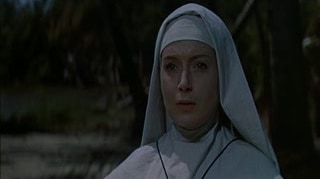 Angela awakes from her fever naked under some blankets, which Allison has covered her with to warm her while her habit dries. We learn that though she trusts Allison to have done the right thing and not taken advantage of her, her real fear is of her own willpower breaking and succumbing to her feelings. Of course, none of this is ever really said explicitly (though Angela comes closest) and it’s left to the view to have the attention span and the intelligence to see what’s really going on.
Angela awakes from her fever naked under some blankets, which Allison has covered her with to warm her while her habit dries. We learn that though she trusts Allison to have done the right thing and not taken advantage of her, her real fear is of her own willpower breaking and succumbing to her feelings. Of course, none of this is ever really said explicitly (though Angela comes closest) and it’s left to the view to have the attention span and the intelligence to see what’s really going on.
Compare that to how a similar scene would be filmed today, even if the script called for the same result- that the relationship not be consummated. Rather than Huston’s tactful and seamlessly poignant cut and dried version, free of all embellishments, we’d have lingering shots of various body parts, close ups of facial expressions and the like. The latter approach would not only ruin the scene but take the film down along with it.
Heaven Knows, Mr. Allison is yet another forgotten gem and though labelled as a war movie (technically correct) it’s better looked at as a character film. At its core it’s the dialogue between Deborah Kerr and Robert Mitchum – both spoken and otherwise- which make this film hard to overlook and impossible to miss.